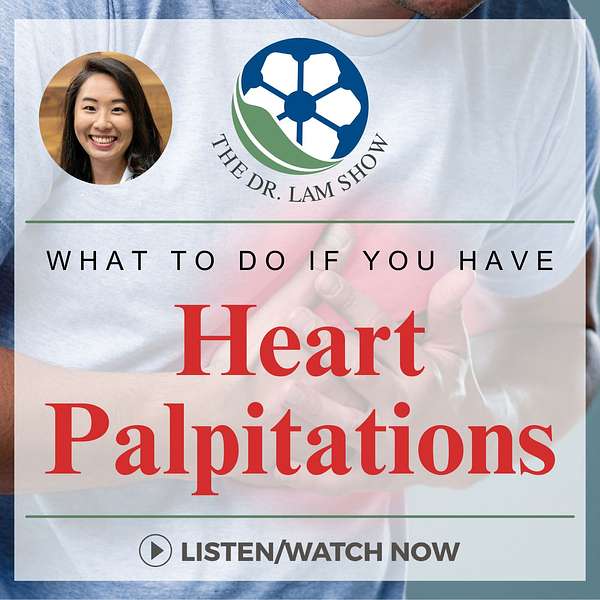
The Dr. Lam Show
The Dr. Lam Show
What To Do If You Have Heart Palpitations
Does your heart rate sometimes or feel like it’s skipping a beat? This is known as heart palpitations. Learn here about some potential causes for this symptom and what you can do about it once you’ve seen your doctor and got a clean bill of health.
Trying to find an integrative medicine or functional medicine doctor who understands what you're going through? Lam Clinic does Telemedicine all over the world and is only a phone call away.
1. Educate yourself by visiting our website: www.lamclinic.com
2. Call our office at 714-709-8000 to schedule an appointment.
FIND US ONLINE HERE:
» Website: https://www.lamclinic.com/
» Facebook: https://www.facebook.com/lamclinic
» Instagram: https://www.instagram.com/lam_clinic/
» Tiktok: https://www.tiktok.com/@lamclinic
» YouTube: https://www.youtube.com/LAMCLINIC
Do you have episodes when it feels like your heart is skipping a beat or beating too quickly? These symptoms are known as heart palpitations, and they can be very frightening and make you feel as if you're going to die. But fortunately, most of the time heart palpitations are harmless, but you should still get checked out with the doctor just in case there are signs of something more serious. Most people don't realize that if their heart is beating most of the time, they can't feel it as it contracts to push blood throughout the body. This is a normal phenomenon. There's a specific hormone that's responsible for making your heart feel as if it's throbbing or pounding harder than usual. That hormone is known as norepinephrine, or noradrenaline. This hormone works as a neurotransmitter in the brain, and also can travel to the heart where it causes your heart to contract harder than usual, and it makes it feel like it's pounding. This hormone makes your heart pound after exercise and during life threatening situations. But if you have the symptom when you're just sitting on the couch, then it indicates that something is off balanced in your body. Heart palpitations can be a cause of a wide range of issues including defects in your heart structure or function in the heart stress, mood disorders, thyroid hormone imbalance, adrenal imbalance, pregnancy or menstruation or menopause, and strenuous exercise or drinking stimulants like caffeine or smoking with nicotine, increased temperature medications that can contain pseudoephedrine, like decongestants, and even drugs. Heart palpitations can also be strongly linked to adrenal fatigue. And Adrenal Fatigue is caused by excessive ongoing stress, which results in ongoing high cortisol levels and adrenal, produced by the adrenal gland, the adrenals also produce epinephrine and norepinephrine. So when you're stressed, it's going to be producing this high energy type of hormone and neurotransmitter that we talked about. And so this neurotransmitter goes and can sometimes cause imbalance in your cardionomic circuit, which includes the heart, the adrenals, and the sympathetic nervous system. And when this circuit becomes unbalanced and dysfunctional, because over time, you're releasing too much norepinephrine and epinephrine, then that can lead to heart palpitations. And so if you suffer from these kinds of symptoms, make sure you go see your doctor. And if they give you a clean bill of health and there are things that you can do that will help to reduce your symptoms. Some effective things to try would be breathing exercises to help calm the body in limiting triggers like caffeine or nicotine and alcohol. Talking to your doctor about medications or supplements that you could be taking that could be causing these symptoms. Because even vitamins and minerals can sometimes glandulars can be overstimulating. Talk to medical professional about supplements that might help they're more calming, whether it's magnesium or GABA, or melatonin, or valerian, five HTP, passionflower, depending on your body and its constitution. Make sure you stay well hydrated and stay out of the sun wherever possible to avoid temperature fluctuations. Keep your electrolytes nice and balanced, especially your sodium and potassium levels. Adopt strategies to help better manage stress like meditation, yoga or Adrenal Breathing exercises, and then eliminate as many causes of stress from your life as possible. We understand that is very difficult, but we are here to help you if you ever have any questions on how to control your heart palpitations and how to get to the root cause. So thanks for listening. We hope you get some helpful tips from what we've shared. Make sure you like and subscribe and share this video with your friends who you think might also be dealing with this. And remember, we're here to empower you to take control of your health.